Module 1 Unit 3 Language in use课件-外研九上
文档属性
| 名称 | Module 1 Unit 3 Language in use课件-外研九上 |
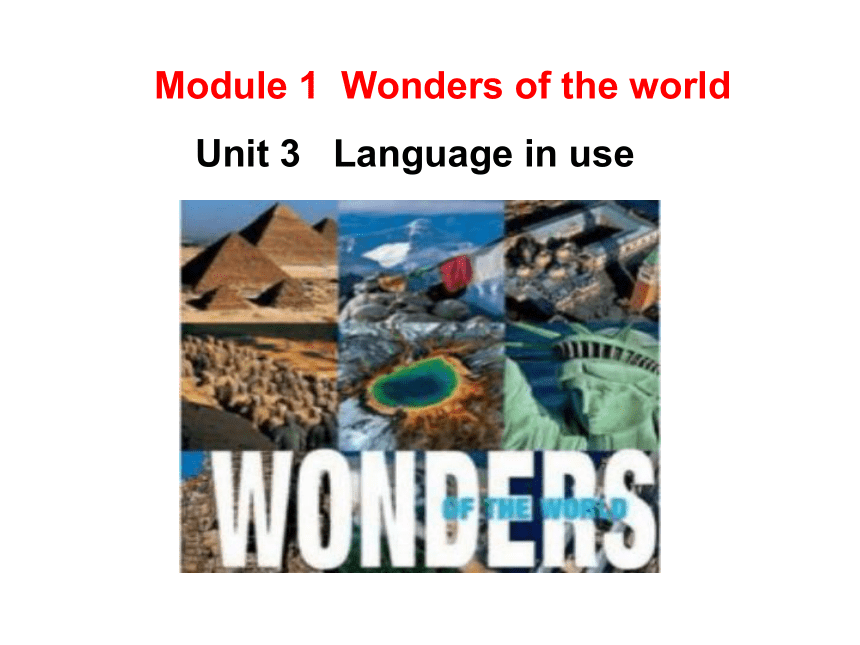
|
|
| 格式 | ppt | ||
| 文件大小 | 6.0MB | ||
| 资源类型 | 试卷 | ||
| 版本资源 | 外研版 | ||
| 科目 | 英语 | ||
| 更新时间 | 2024-08-30 00:00:00 | ||
图片预览



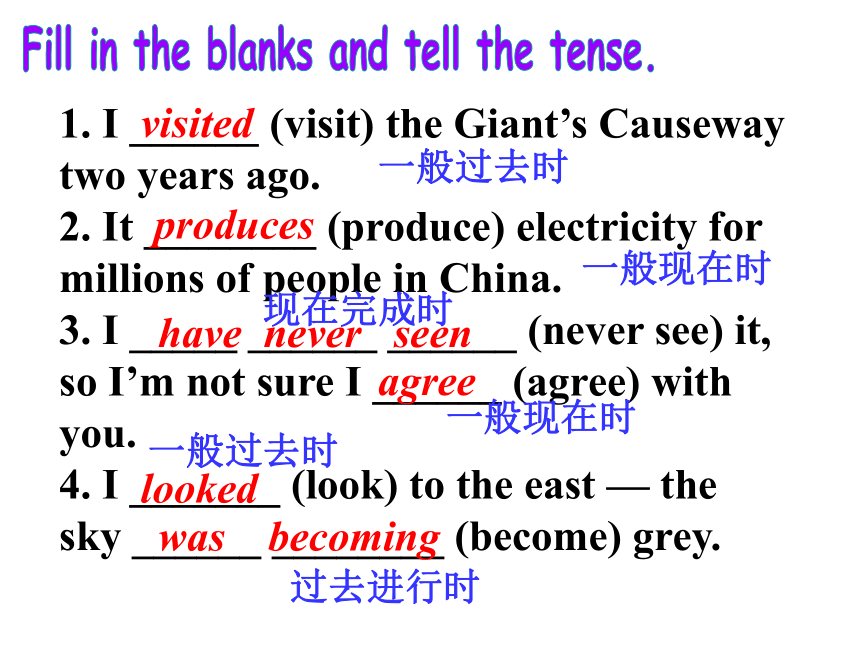


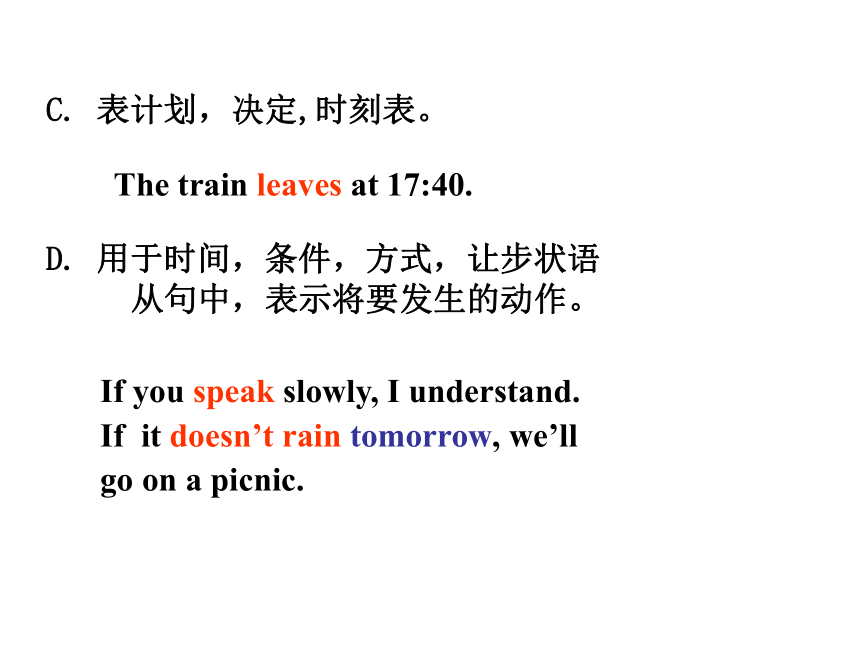
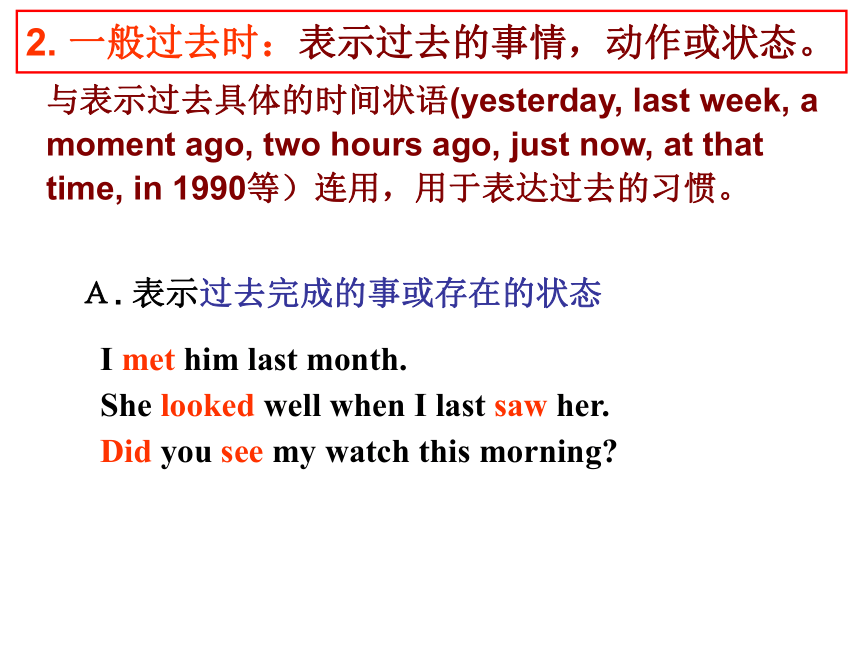
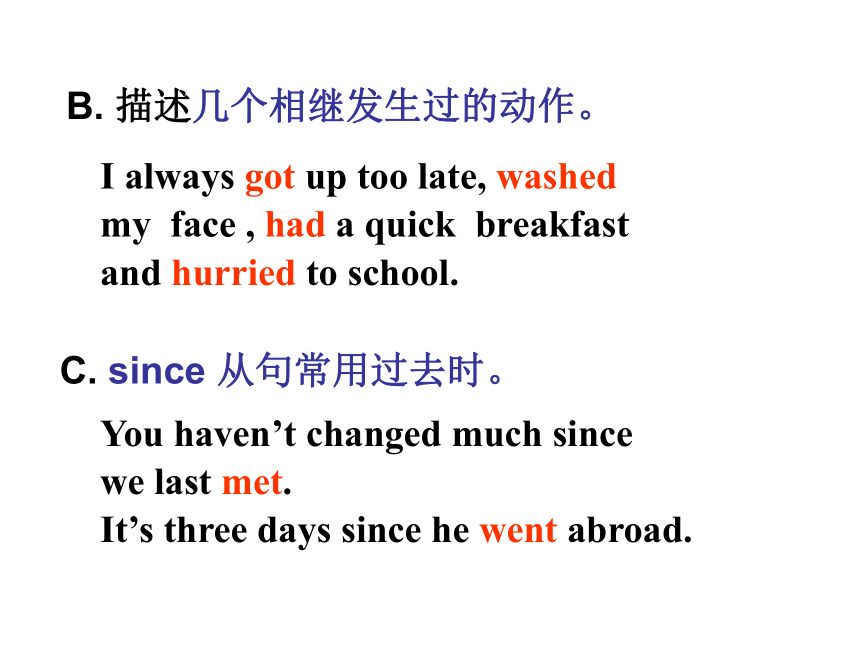
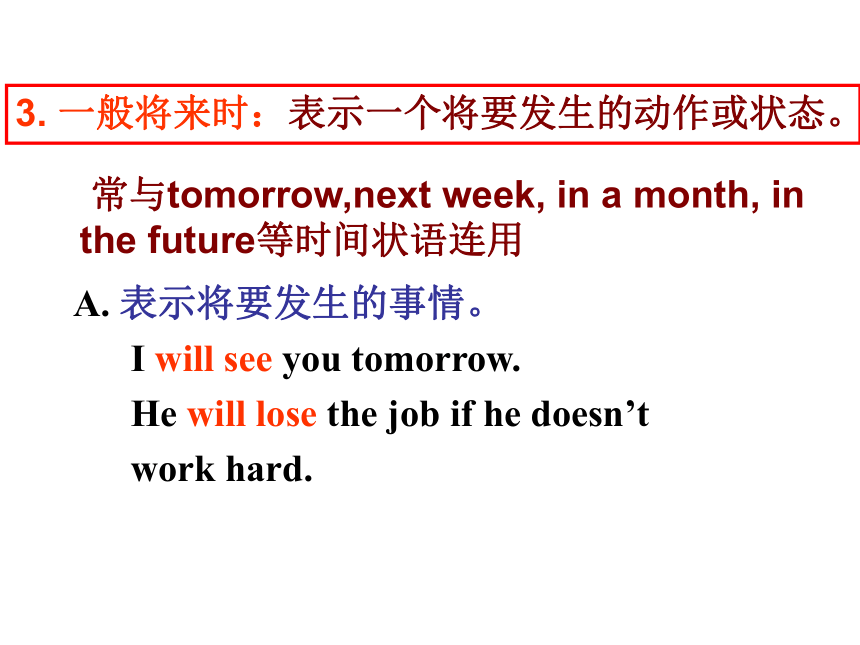
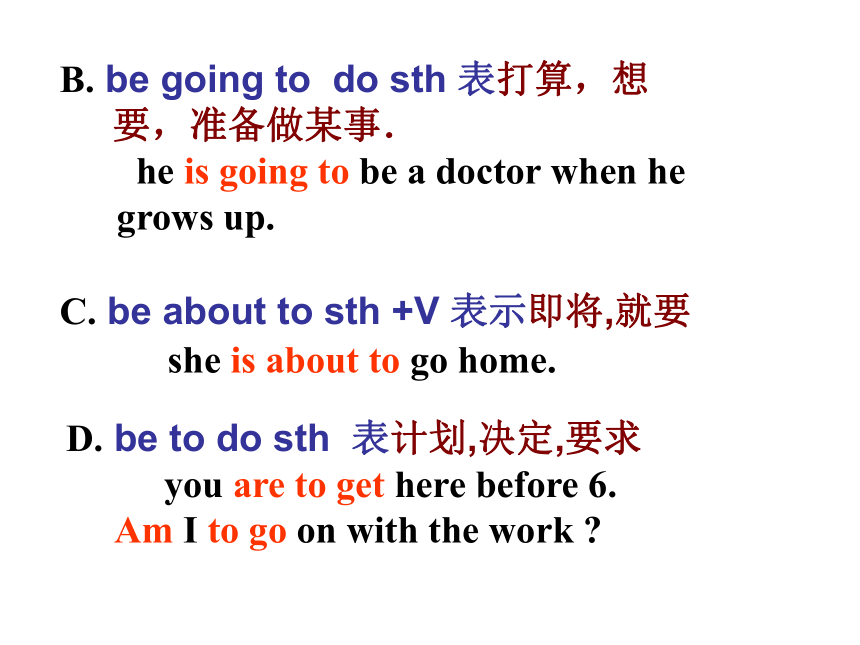
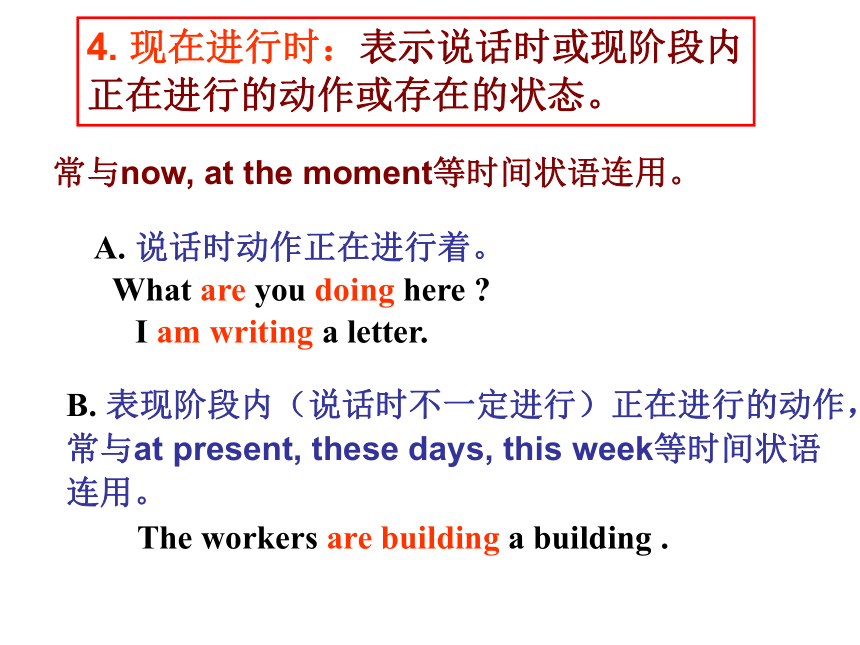
文档简介
(共100张PPT)
Module 1 Wonders of the world
Unit 3 Language in use
一般现在时
一般过去时
一般将来时
现在进行时
过去进行时
现在完成时
二、在初一和初二阶段已经学过的时态:
动词原形或 动词+s / es
动词过去式
will +V.
am/is /are +V. ing
was/ were +V. ing
have /has +P.P
1. I ______ (visit) the Giant’s Causeway two years ago.
2. It ________ (produce) electricity for millions of people in China.
3. I _____ ______ ______ (never see) it, so I’m not sure I ______ (agree) with you.
4. I _______ (look) to the east — the sky ______ ________ (become) grey.
visited
produces
have never seen
agree
was becoming
looked
一般过去时
一般现在时
现在完成时
一般现在时
一般过去时
过去进行时
5. You ______ ______ (get) there in five minutes.
6. _____ I ______ (go) the right way
7. The sun ______ (rise) behind me and _______ (shine) on the rocks.
8. I think the Giant’s Causeway _______ (be) the most fantastic natural wonder.
will get
Am going
rose
shone
is
现在进行时
一般过去时
一般现在时
一般将来时
三 、时态的用法
1.一般现在时:是表述现在或经常性的动作,状态.
A. 表述现阶段或经常性的动作,状态。常与often, usually, sometimes, every day/week, on Sunday, in the morning/afternoon/evening 等时间状语连用。
如:他每天骑自行车上学。
He goes to school by bike every day.
B. 表客观真理
地球绕着太阳转。
The earth goes round the sun.
C. 表计划,决定,时刻表。
The train leaves at 17:40.
D. 用于时间,条件,方式,让步状语
从句中,表示将要发生的动作。
If you speak slowly, I understand.
If it doesn’t rain tomorrow, we’ll
go on a picnic.
与表示过去具体的时间状语(yesterday, last week, a moment ago, two hours ago, just now, at that time, in 1990等)连用,用于表达过去的习惯。
A. 表示过去完成的事或存在的状态
I met him last month.
She looked well when I last saw her.
Did you see my watch this morning
2. 一般过去时:表示过去的事情,动作或状态。
B. 描述几个相继发生过的动作。
I always got up too late, washed
my face , had a quick breakfast
and hurried to school.
C. since 从句常用过去时。
You haven’t changed much since
we last met.
It’s three days since he went abroad.
3. 一般将来时:表示一个将要发生的动作或状态。
A. 表示将要发生的事情。
I will see you tomorrow.
He will lose the job if he doesn’t
work hard.
常与tomorrow,next week, in a month, in the future等时间状语连用
B. be going to do sth 表打算,想
要,准备做某事.
he is going to be a doctor when he
grows up.
C. be about to sth +V 表示即将,就要
she is about to go home.
D. be to do sth 表计划,决定,要求
you are to get here before 6.
Am I to go on with the work
常与now, at the moment等时间状语连用。
A. 说话时动作正在进行着。
What are you doing here
I am writing a letter.
B. 表现阶段内(说话时不一定进行)正在进行的动作,常与at present, these days, this week等时间状语连用。
The workers are building a building .
4. 现在进行时:表示说话时或现阶段内
正在进行的动作或存在的状态。
C. 表示已具体“计划,安排”的将来
的动作。
She is leaving for Beijing this evening .
I’m flying to Shanghai tomorrow .
D. 表示特定的感彩(表示赞扬或者厌恶)。
She is always thinking of others
instead of herself .
we are looking forward to seeing
you again.
1. 构成:
was / were + doing
常与at that time/moment, yesterday等时间状语或when,while 等引导的时间状语从句连用
I was reading a book at 5 p.m. yesterday.
What were they doing just now
My mother was washing clothes at 9 last night.
What was he researching all day last Sunday
5. 表示过去某时正在进行的状态或动作。
S1: What were you doing while Li Jie was getting ready to go out
S2: I was sleeping while Li Jie was getting ready to go out.
S1: What were you doing while she was tavelling on the underground
S2: I ___________ while she was travelling on the underground.
用法二:表示在过去的某个时间,前后两个动作是同时进行的。
My brother fell while he was riding his bicycle.
It was raining when they left the station.
6. 现在完成时:
He has phoned me about the theft.
I have just come back from the U.S.
He has turned off the light .
常与already , yet ,ever,never,
just, by this time等时间状语连用.
A. 表示动作已发生,这个动作的结果对现在仍有影响。
B. 表一个动作从过去发生, 一直持续
到现在。
I have learned English for more
than 6 years.
We have known each other since
childhood.
C. have been 和 have gone的区别。
It can’t be Jim. he has gone to town .
John knows the way well. He has been to the city before .
D. Since和for引导的都是持续性的一段时间。Since后可接过去的一个时间点,也可以接一段时间+ago,还可以接从句;而for后只接时间段。
My father has been an engineer since 2005.
She has been a doctor since two years ago
E. 终止性动词和持续性动词
1. 他来北京五天了。
He has come to Beijing for 5 days.
He has been in Beijing for 5 days.
×
√
E. 终止性动词和持续性动词
Xiao Ming has joined the League for three years.
Xiao Ming has been in the League for 3 years.
Xiao Ming has been a League member for 3 years
2. 小明入团三年了。
×
√
√
3. 这本书他买了一年了。
He has bought this book for
a year.
He has had this book for a year.
E. 终止性动词和持续性动词
×
√
4. 这本书他借了三天了。
He has borrowed the pen for
three days.
He has kept the book for 3 days.
E. 终止性动词和持续性动词
×
√
F. 现在完成时常用时间状语
since ….., for….., yet, ever, already , many times , just , this week , recently , lately , so far , in the past few years, still, etc.
1. —Have scientists found life on Mars
—Not yet, but I think they ___________ it some day. (2020,温州)
A. find B. found C. have found D. will find
2. —Jim, turn down the music. Our baby is sleeping. (2020,江苏常州)
—Don’t worry. He__________ for half an hour.
A. woke up B. has woken up
C. was awake D. has been awake
3. — What’s your father doing now
— He _______ the room. (2018北京)
A. cleaned B. cleans
C. has cleaned D. is cleaning
4. Sorry, you can’t take the dictionary away, Vicky. I ________ it. (2020,江苏南京 )
used B. am using
C. have used D. was using
5. Joe, my close friend, moved to Beijng
years ago, and I ______ him since then.
(2017河南)
A. don’t see B. didn’t see
C. haven’t seen D. won’t see
6. Mike is from America. He _______
English. (2018 湖北武汉)
A. spoke B. will speak
C. speaks D. has spoken
7. —Do you know the boy over there
— Sure. I ____ him for years.
(2017 陕西)
A. knew B. will know
C. have known D. known
Have a try:
1.My mother often _______(read)books in the early morning.
2.Since two years ago, I___________(live)in this school.
3.A few minutes later the fog_________(clear)and the sun
came out.
4.When my father was cooking, my mother__________(sleep).
5.My teacher ________(finish)a new book one month ago.
6.Who wrote the book________(call) My Mother
7.The film____________(not begin) until 8 last night.
8.---Where is your sister
---She_____________(have) a meeting in the office.
reads
have lived
cleared
was sleeping
finished
called
didn’t begin
is having
P6
1
Explain the differences in meaning between Sentences a) and b).
1 a) I often play basketball.
b) I am playing basketball now.
2 a) She has gone to the Great Wall.
b) She has been to the Great Wall.
3 a) They had an English class yesterday.
b) They were having an English class at nine o’clock yesterday morning.
现在经常做…
现在正在做…
去了某地
去过某地
过去某时间做过
过去某时间正在做
4 a) He is doing an interview.
b) He has done an interview.
5 a) We are drawing a picture of Victoria Falls now.
b) We will draw a picture of Victoria Falls.
现在正在做…
现在已经做完…
现在正在做…
将要做…
2. Complete the sentences with the correct form of the words in the box.
Listen! It ___________ outside.
The great musician __________a concert
in Guangzhou next month.
3. Last summer, my parents _______ the Terracotta Army in Xi’an.
4. He _____ already ________a new book about travel.
appear finish give rain talk visit walk
is raining
will give
visited
has
finished
5. Thousands of people ______ along the Great Wall every year.
6. A few minutes later, a stranger _______ at the end of the street.
7. The students _____________ about the journey to the Grand Canyon when the teacher came into the classroom.
walk
appeared
were talking
The Jin Mao Tower in Shanghai
one of the tallest buildings in the world
P7
3
Complete the passage.
The sun was going down when we (1)
_______ (arrive) at the ground floor of the
building. I (2)____ (be) afraid of going to the
top of tall buildings, so I was a little nervous
when I (3)______ (walk) into the lift. The lift
(4)________ (climb) faster and faster until
we (5)________(reach) the 88th floor. It (6)
_____ (be) high up there, but I was not afraid
when I stood at the top.
The Jin Mao Tower in Shanghai, one of
the tallest buildings in the world, (7) ___(be)
arrived
was
walked
climbed
reached
was
is
420.5 metres high. It was built in 1999, and
it (8) _____ (have) a fantastic view of Pudong
District and the center of Shanghai. I really
like the tower and I am sure I (9)_________
(visit) it again.
has
will visit
5. Complete the sentences with the correct from of the words in the box.
There is one extra word.
ancient high long natural opinion wonder
The Changjiang River is about 6,300
kilometres _______.
2.The Terracotta Army is a famous ____
wonder in China.
3.For my homework I have to write an
article about the _______ of the world.
long
ancient
wonders
4.Mount Qomolangma is the ________
mountain in the world.
5.In my ________, the Great Wall is the
greatest man- made wonder in the world.
highest
opinion
6.Complete the passage with the
expressions in the box.
agree with at the bottom of go through looking forward to millions of more than
I’m really (1) __________________ my visit
to the Louvre Museum in Paris. It’s the most
visited museum in the world --- every year,
(2) __________people visit it. The Louvre
is in an old building, but to get inside you
must (3)______________ a giant glass
pyramid that is (4) __________ 20 metres tall.
The entrance to the museum is (5) _________
looking forward to
millions of
go through
more than
at the bottom of
the pyramid. Some people do not like the glass pyramid. They say it looks too new and does not suit the older buildings. I do not (6) ____________ them. I think it looks great!
agree with
7. Listen and number the pictures.
8. Listen again and complete the table.
The Louvre Museum in Paris
The entrance is at the bottom of the glass pyramid.
We must go through a giant glass pyramid
that is more than 20 meters tall.
P8
7
Listen for more information about the Great pyramid of Giza and other wonders of the world.
a
b
c
Listen and number.
P8
8
Listen again and complete the table.
Mount Qomolangma The Empire State Building The Great Pyramid at Giza
Location Between China and Nepal
___________ In Egypt
Height ___________
metres ________ metres About ______ metres now
Interesting facts First people to climb to the top: Sir Edmund Hillary and Tenzing Norgay _________ floors About ________ years old
137
4500
8,844.43
In New York
381
102
9. Work in pairs. Think about three other wonders of the world and talk about them.
A: Where is …
B: It’s ….
A: How high is it
B: It’s … metres high.
Around the world
Stonehenge:
A man-made wonder of the world
Read and answer:
Where is Stonehenge
How high is it
1. China is ___ the east of Asia.
2. Taiwan Province is ___ the southeast of China.
3. Sichuan province is ___ the north of
Guizhou province.
4. Japan is ___ the east if China.
on
in
to
1. in the south of England
位于英格兰南部
in
in
on
to
because conj. 因为(其后接句子)
I’m late, because the weather is
too bad.
2. because of … 因为……(介词短语,
后接名词、代词或动名词)
We have to put off the basketball match because of the heavy rain.
*
*
时态 一般现在时 一般过去时 现在进行时 过去进行时 一般将来时 现在完成时
用法 表示经常性发生的动作、习惯性动作或客观真理、科学事实等。 表示过去某个时间发生的动作或存在的状态。 表示现在或现阶段正在进行或发生的动作。 表示过去某时正在进行的动作或存在的状态。 表示将来某个时间要发生的动作或存在的状态。 表示过去发生或者未发生的事对现在造成的影响或结果。
构成
方式 1. 动词be(am/is/are)
+ 表语…
2. 动词原形 + …
(主语是第三人称单
数,动词也用第三人称单数) 1. 动词was/were
+ 表语
2. 实义动词的过
去式 + … be(am/is/are) + 动词的现在分词 was / were + 动词的现在分词 1. will/shall + 动词原形
(shall 用于第一人称)
2. be going to + 动词原形 主语 + have / has + 过去分词 + …
句
型
变
化 疑
问
式 1. Be + 主语 + …
2. Do/Does + 主语 +
动词原形+ … 1. Was/Were + 主
语 + …
2. Did + 主语 +
动词原形 + … Be + 主语 + 动词的现在分词 + … Was / Were + 主语 + 动词的现在分词 + …? 1. Will/Shall + 主语 + 动词原形+ …
2. Be + 主语+ going to + 动词原形 + … Have / Has + 主语 + 过去分词 + …?
否
定
式 1. 主语 + be + not + …
2. 主语+don’t/doesn’t
+ 动词原形 + … 1. 主语 + was/were
+ not +…
2. 主语 + didn’t +
动词原形 + … 主语 + be + not
+ 动词的现在分词 + … 主语 +
wasn’t (was not) /
weren’t (were not) + 动词的现在分词 + … 1. 主语 + will/shall not + 动词原形 + …
2. 主语 + be + not + going to + 动词原形 + … 主语 + haven’t / hasn’t + 过去分词 + …
Homework
以下部分为六种时态的梳理、比较以及相关的语法练习题,供老师在语法讲解时选择使用。
表示经常性发生的动作、存在的状态、日常行为、爱好、习惯性动作或客观真理、科学事实等。
I go to school at 6:30 every morning.
我每天早上六点半去上学。
The girl sings very well.
那个女孩唱得非常好。
主语人称
第一人称单数
第三人称单数
第一、三人称复数
第二人称
be动词形式
am
is
are
I am a junior high school student.
Miss Li is our English teacher.
LiMing and WangLin are my classmates.
主语人称
第一人称单数
第三人称单数
第一、三人称复数
第二人称
实义动词形式
do (动词原形)
-s / es (第三人称单数)
do (动词原形)
We play basketball after school.
My uncle teaches at Sunshine Middle School.
I have a good friend.
1. 直接在动词后+s
like - likes play - plays
2. 以s, x, sh, ch接尾的动词:+es
wash-washes
3. 以辅音+o接尾的动词:+es
do - does go - goes
4. 以辅音+y接尾的动词:变y为i+es
fly-flies
实义动词第三人称单数的变化规则
实义动词一般现在时的否定句和疑问句构成要借助助动词do或does。
Students do not go to school on Sunday.
— Does your father go home at five in
the afternoon
— Yes, he does. / No, he doesn’t.
一般
过去时
构成
用法
常用
时间状语
动词的过去式
1. 表示过去某个时
间发生的动作或
存在的状态。
2. 表示过去经常或
反复发生的动作。
yesterday
last night
in 1990
two days ago …
1. 一般在动词末尾加-ed,如:pull-pulled, cook-cooked
2. 结尾是e加d,如:taste-tasted
3. 末尾只有一个元音字母和一个辅音字母的重读闭音节,应双写末尾的辅音字母,再加-ed,如:stop-stopped
4. 以“辅音字母+y”结尾的,变y为i, 再加-ed,如:study-studied
5. 常用不规则动词过去式:
am/is-was are-were
do-did see-saw say-said give-gave
get-got go-went come-came have-had
eat-ate take-took run-ran sing-sang
put-put make-made read-read
write-wrote draw-drew drink-drank
fly-flew ride-rode speak-spoke
sweep-swept swim-swam sit-sat
表示过去某个时间发生的动作或存在
的状态。
He said that here yesterday.
I got up at six thirty yesterday morning.
My father wrote a passage yesterday
afternoon.
Did you have a good time last summer
2. 表示过去经常或反复发生的动作。
My father often went to work by
bus last year.
When I was a child, I often listened
to music.
yesterday
yesterday morning / afternoon / evening
last night / week / month / year …
two days / a week / three years ago …
in 1990 …
…
肯定式:
主语 + 动词过去式 + …
We heard a sound.
否定式:
主语 + did + not + 动词原形 + …
We did not / didn’t hear any sound.
一般疑问式:
Did + 主语 + 动词原形 + …
Did you hear a sound
Yes, we did. / No, we didn’t.
be
am
is
are
was
were
肯定式:主语 + was / were + …
否定式:主语 + was not (wasn’t) /
were not (weren’t) + …
一般疑问式:
Was / Were + 主语 + …
Yes, 主语 + was / were.
No, 主语 + was not (wasn’t) / were not (weren’t).
一般过去时
肯定式 主语 + was / were + 其他. 主语 + 动词的过去式 + 其他.
否定式 was
主语 + not + 其他.
were 主语 + didn’t + 动词原形 + 其他.
一般疑
问句及
回答 Was / Were + 主语 + 其他
(肯) Yes, 主语 + was / were.
(否) No, 主语 + wasn’t /
weren’t. Did + 主语 + 动词
原形 + 其他
(肯) Yes, 主语 + did.
(否) No, 主语 +
didn’t.
巧记动词过去时态
动词一般过去时,表示过去发生事;
be用was或用were,have, has变had;
谓语动词过去式,过去时间做标志;
一般动词加-ed,若是特殊得硬记;
否定句很简单,主语之后didn’t添;
疑问句也不难,did放在主语前;
谓语之前有did,谓语动词需还原;
动词若是was, were,否定就把not添。
① 肯定句: 主语 + am/is/are + -ing
② 否定句: 主语 + am/is/are + not + -ing
③ 疑问句: Am/Is/Are + 主语 + -ing
现在进行时表示现在或现阶段正在进行或发生的动作。
表示说话时正在进行的,目前正在发生的动作。常带有表示目前时刻的时间副词, 如:now, at the (very) moment, for the time being, at present, 及Look! Listen! ...
① Look! The big bird is flying away.
看,那只大鸟正在飞走。
② He is watching a movie now.
他现在正在看电影。
2) 表示目前一段时间内正在进行,但
说话时可能没有进行的动作。
Right now I am studying Chinese by distance learning.
我现在正通过远程教育学习汉语。
3) 与always, constantly, forever, all the
time等副词连用,表示动作反复或习
惯。此时句子常含有说话者的强烈
情感在内。表达较强的“责备”或“表
扬”之意。
① You are always changing your mind.
你总是主意不定。(太烦人了。)
② He is always helping others.
他总是帮助别人。(他真是个好人。)
① He is leaving on Wednesday.
他将于周三离开。
② Mary isn’t here at the moment.
She is coming later.
玛丽现在不在这儿,她一会儿来。
4) 对于come, go, leave, arrive, start等
表示位置移动的动词常可用进行时
态表将来。
在过去某一时刻正在进行的动作
They were eating breakfast at 7:00 am
yesterday.
(b) I was writing a letter at this time
yesterday.
(c) Five minutes ago, Danny was looking
out of the window and Suzy was
reading a book.
过去进行时表示过去某时正在进行的
动作或存在的状态。
2. 在过去某段时间一直在进行的动作
(a) From 1983 to 1998, he was teaching
at Yale.
(b) They were building a dam last
winter.
(1) 基本结构:was / were + verb-ing
(2) 否定式:was / were not + verb-ing
was not = wasn’t were not = weren’t
I was doing some shopping.
People were running wildly.
I was not reading.
People were not running wildly.
(3) 疑问句:将 was / were调到主语前
结构为:Was / Were + 主语 + verb-ing
回答:Yes, 主语 + was/were.
No, 主语 + was not/wasn’t.
were not/weren’t.
Was he running
Yes, he was. / No, he wasn’t.
Were they running
Yes, they were. / No, they weren’t.
when, while和as这三个词都有
“当……时候”的意思。
Past continuous tense with
‘while’ , ‘when’ and ‘as’
While Mille was watching TV, her mum was sleeping.
米莉在看电视时,妈妈在睡觉。
I saw a traffic accident as I was riding to school this morning.
今天早晨我骑车去学校时看到一起交通事故。
Was he doing his homework when the
teacher came in
当老师进来时,他正在做作业吗?
【拓展】
现在进行时可以表示将来的动作,同样,过去进行时也可以表示从过去某时看来将要发生的动作。
Lucy arrived in Beijing last Friday, but she was leaving for Hong Kong the next
morning.
上周五露西到达北京,但第二天早晨就要动身去香港了。
一般将来时其构成形式通常有以下两种:
■ will / shall + 动词原形
(shall用于第一人称)
■ be going to + 动词原形
一般将来时表示将来某个时间要发生的动作或存在的状态。
用法
We use will or shall when we talk about:
things that are sure to happen in the
future
plans that we are making now
Simple future tense with will and shall
主语 + will / shall + 动词原形……
主语 + will / shall not + 动词原形……
Will / Shall + 主语 + 动词原形……
Yes, 主语 + will / shall.
No, 主语 + will not (won’t) / shall not (shan’t).
We usually use will. We only use shall with I or we, and this usage is becoming old-fashioned.
We use be going to when we talk about:
1. something we decide to do
2. things that will probably happen
Simple future tense with
be going to
主语 + be going to + 动词原形……
主语 + be not going to + 动词原形……
Be + 主语 + going to + 动词原形……
1) be going to表示将来的打算,有时并
没有特定的将来时间状语。
I am going to be a basketball player.
我想成为一名篮球运动员。
2) what, where, when, how引导的特殊
疑问句
How are you going to do that
你打算怎样做?
next Monday / Tuesday ...
next week / month / year …
the coming Sunday / Monday …
this afternoon / evening
tomorrow
the day after tomorrow
tonight
现在完成时表示过去发生或者未发生的事对现在造成的影响或结果。
肯定句:主语 + have / has + 过去分词 +
其他
否定句:主语 + haven’t / hasn’t + 过去分
词 + 其他
一般 Have / Has + 主语 + 过去分词 +
疑问句:…?
肯定答语:Yes, 主格代词 + have / has.
否定答语:No, 主格代词 + haven’t / hasn’t.
1. 表示动作到现在为止已经完成或刚刚完成。
I have finished my work.
We have set up many new factories.
2. 动作发生在过去,强调对现在的结果、
影响等。
Have you ever seen the film “Harry
Potter”
I’ve spent 3 years in the countryside.
3. 表示动作发生在过去,并且一直持续到现在,甚至还可能继续下去,句中使用持续性动词,且常有表示一段时间的时间状语。
We haven’t seen each other for ten years.
I’ve been an English teacher for about 20 years.
4. 现在完成时可以用在条件或时间状语从句中,表示将来某个时刻之前已经完成的动作。
I’ll go home as soon as I have finished my homework.
Please lend me that book if you have finished reading it.
1) 现在完成时 + since + 点时间状语(名词、短语、从句,其中从句用一般过去时)
2) 现在完成时 + for + 段时间状语
3) It / This is the first / 其他序数词 / last time + that 从句中,从句使用现在完成时。
1) Mary has been ill since three days ago.
2) Mary has been ill for three days.
3) It is the first time that I have visited the city. This is the best film that I’ve (ever) seen.
现在完成时表示某一已经完成的动作对现在造成的结果或影响,强调的是现在的情况,所以不能与表示过去的时间状语连用;一般过去时只表示某一动作或状态在过去发生或存在过, 与现在不发生联系,它可以与表示过去的时间状语连用。
He has read that book.
(说明他现在知道那本书的内容。)
He read that book last year.
(只说明他去年读过那本书。 )
He has gone to America.
(他现在不在此地, 到美国去了。)
He went to America.
(只说明他去过美国。)
1. already 已经,常用于肯定句中。
I have already seen the film.
我已经看过这部电影了。
2. yet
1) 已经,常用在疑问句中。
Has Linda read the book yet
琳达已看过这本书了吗
2) 还,仍然,常用于否定句和疑问句。
He has not begun to work yet.
他还未开始工作。
3. just 刚刚,常用于肯定句中
I have just finished lunch.
我刚吃过午饭。
4. never 从来没有,表示否定
He has never seen such a tall building.
他从未见过这么高的楼。
5. ever 曾经,主要用于疑问句
Have you ever wanted to travel around
the world
你曾经想要周游世界吗?
Ⅰ. 用括号内所给动词的适当形式填空。
1. Mr Wang is our maths teacher and he _______ (go) home once a month.
2. Listen! Who ________ (cry) in the next room
3. Jane ____________ (water) the flowers in the garden at this time yesterday.
goes
is crying
was watering
Quiz
4. I _________ (use) this pen for a long time but it’s still good.
5. The Kings _____________________ (visit) a friend of theirs next week.
6. You _____still ________ (read)
a novel! But it’s time for the
meeting.
7. They __________ (know) each other
since they were young boys.
have used
will visit/ are going to visit
have known
are reading
Ⅱ. 单项选择
1. Liu Yang ______ Hong Kong three times already.
A. was in B. went to
C. has gone to D. has been to
2. — When Tom ______ here, we will finish the work.
— I’m afraid so.
A. will get B. gets
C. got D. is getting
3. — Where ______ your cousin ______ two years ago, Lucy
— In Changchun.
A. did; work B. does; work
C. has; worked D. will; work
4. — _______ you ______ him anywhere
before
— Yes, but I can’t remember where I ______ him.
A. Did; meet; met B. Have; met; met
C. Did; meet; have met
D. Have; met; have met
5. There _______ an important meeting tomorrow afternoon.
A. was
B. is going to have
C. had
D. is going to be
Module 1 Wonders of the world
Unit 3 Language in use
一般现在时
一般过去时
一般将来时
现在进行时
过去进行时
现在完成时
二、在初一和初二阶段已经学过的时态:
动词原形或 动词+s / es
动词过去式
will +V.
am/is /are +V. ing
was/ were +V. ing
have /has +P.P
1. I ______ (visit) the Giant’s Causeway two years ago.
2. It ________ (produce) electricity for millions of people in China.
3. I _____ ______ ______ (never see) it, so I’m not sure I ______ (agree) with you.
4. I _______ (look) to the east — the sky ______ ________ (become) grey.
visited
produces
have never seen
agree
was becoming
looked
一般过去时
一般现在时
现在完成时
一般现在时
一般过去时
过去进行时
5. You ______ ______ (get) there in five minutes.
6. _____ I ______ (go) the right way
7. The sun ______ (rise) behind me and _______ (shine) on the rocks.
8. I think the Giant’s Causeway _______ (be) the most fantastic natural wonder.
will get
Am going
rose
shone
is
现在进行时
一般过去时
一般现在时
一般将来时
三 、时态的用法
1.一般现在时:是表述现在或经常性的动作,状态.
A. 表述现阶段或经常性的动作,状态。常与often, usually, sometimes, every day/week, on Sunday, in the morning/afternoon/evening 等时间状语连用。
如:他每天骑自行车上学。
He goes to school by bike every day.
B. 表客观真理
地球绕着太阳转。
The earth goes round the sun.
C. 表计划,决定,时刻表。
The train leaves at 17:40.
D. 用于时间,条件,方式,让步状语
从句中,表示将要发生的动作。
If you speak slowly, I understand.
If it doesn’t rain tomorrow, we’ll
go on a picnic.
与表示过去具体的时间状语(yesterday, last week, a moment ago, two hours ago, just now, at that time, in 1990等)连用,用于表达过去的习惯。
A. 表示过去完成的事或存在的状态
I met him last month.
She looked well when I last saw her.
Did you see my watch this morning
2. 一般过去时:表示过去的事情,动作或状态。
B. 描述几个相继发生过的动作。
I always got up too late, washed
my face , had a quick breakfast
and hurried to school.
C. since 从句常用过去时。
You haven’t changed much since
we last met.
It’s three days since he went abroad.
3. 一般将来时:表示一个将要发生的动作或状态。
A. 表示将要发生的事情。
I will see you tomorrow.
He will lose the job if he doesn’t
work hard.
常与tomorrow,next week, in a month, in the future等时间状语连用
B. be going to do sth 表打算,想
要,准备做某事.
he is going to be a doctor when he
grows up.
C. be about to sth +V 表示即将,就要
she is about to go home.
D. be to do sth 表计划,决定,要求
you are to get here before 6.
Am I to go on with the work
常与now, at the moment等时间状语连用。
A. 说话时动作正在进行着。
What are you doing here
I am writing a letter.
B. 表现阶段内(说话时不一定进行)正在进行的动作,常与at present, these days, this week等时间状语连用。
The workers are building a building .
4. 现在进行时:表示说话时或现阶段内
正在进行的动作或存在的状态。
C. 表示已具体“计划,安排”的将来
的动作。
She is leaving for Beijing this evening .
I’m flying to Shanghai tomorrow .
D. 表示特定的感彩(表示赞扬或者厌恶)。
She is always thinking of others
instead of herself .
we are looking forward to seeing
you again.
1. 构成:
was / were + doing
常与at that time/moment, yesterday等时间状语或when,while 等引导的时间状语从句连用
I was reading a book at 5 p.m. yesterday.
What were they doing just now
My mother was washing clothes at 9 last night.
What was he researching all day last Sunday
5. 表示过去某时正在进行的状态或动作。
S1: What were you doing while Li Jie was getting ready to go out
S2: I was sleeping while Li Jie was getting ready to go out.
S1: What were you doing while she was tavelling on the underground
S2: I ___________ while she was travelling on the underground.
用法二:表示在过去的某个时间,前后两个动作是同时进行的。
My brother fell while he was riding his bicycle.
It was raining when they left the station.
6. 现在完成时:
He has phoned me about the theft.
I have just come back from the U.S.
He has turned off the light .
常与already , yet ,ever,never,
just, by this time等时间状语连用.
A. 表示动作已发生,这个动作的结果对现在仍有影响。
B. 表一个动作从过去发生, 一直持续
到现在。
I have learned English for more
than 6 years.
We have known each other since
childhood.
C. have been 和 have gone的区别。
It can’t be Jim. he has gone to town .
John knows the way well. He has been to the city before .
D. Since和for引导的都是持续性的一段时间。Since后可接过去的一个时间点,也可以接一段时间+ago,还可以接从句;而for后只接时间段。
My father has been an engineer since 2005.
She has been a doctor since two years ago
E. 终止性动词和持续性动词
1. 他来北京五天了。
He has come to Beijing for 5 days.
He has been in Beijing for 5 days.
×
√
E. 终止性动词和持续性动词
Xiao Ming has joined the League for three years.
Xiao Ming has been in the League for 3 years.
Xiao Ming has been a League member for 3 years
2. 小明入团三年了。
×
√
√
3. 这本书他买了一年了。
He has bought this book for
a year.
He has had this book for a year.
E. 终止性动词和持续性动词
×
√
4. 这本书他借了三天了。
He has borrowed the pen for
three days.
He has kept the book for 3 days.
E. 终止性动词和持续性动词
×
√
F. 现在完成时常用时间状语
since ….., for….., yet, ever, already , many times , just , this week , recently , lately , so far , in the past few years, still, etc.
1. —Have scientists found life on Mars
—Not yet, but I think they ___________ it some day. (2020,温州)
A. find B. found C. have found D. will find
2. —Jim, turn down the music. Our baby is sleeping. (2020,江苏常州)
—Don’t worry. He__________ for half an hour.
A. woke up B. has woken up
C. was awake D. has been awake
3. — What’s your father doing now
— He _______ the room. (2018北京)
A. cleaned B. cleans
C. has cleaned D. is cleaning
4. Sorry, you can’t take the dictionary away, Vicky. I ________ it. (2020,江苏南京 )
used B. am using
C. have used D. was using
5. Joe, my close friend, moved to Beijng
years ago, and I ______ him since then.
(2017河南)
A. don’t see B. didn’t see
C. haven’t seen D. won’t see
6. Mike is from America. He _______
English. (2018 湖北武汉)
A. spoke B. will speak
C. speaks D. has spoken
7. —Do you know the boy over there
— Sure. I ____ him for years.
(2017 陕西)
A. knew B. will know
C. have known D. known
Have a try:
1.My mother often _______(read)books in the early morning.
2.Since two years ago, I___________(live)in this school.
3.A few minutes later the fog_________(clear)and the sun
came out.
4.When my father was cooking, my mother__________(sleep).
5.My teacher ________(finish)a new book one month ago.
6.Who wrote the book________(call) My Mother
7.The film____________(not begin) until 8 last night.
8.---Where is your sister
---She_____________(have) a meeting in the office.
reads
have lived
cleared
was sleeping
finished
called
didn’t begin
is having
P6
1
Explain the differences in meaning between Sentences a) and b).
1 a) I often play basketball.
b) I am playing basketball now.
2 a) She has gone to the Great Wall.
b) She has been to the Great Wall.
3 a) They had an English class yesterday.
b) They were having an English class at nine o’clock yesterday morning.
现在经常做…
现在正在做…
去了某地
去过某地
过去某时间做过
过去某时间正在做
4 a) He is doing an interview.
b) He has done an interview.
5 a) We are drawing a picture of Victoria Falls now.
b) We will draw a picture of Victoria Falls.
现在正在做…
现在已经做完…
现在正在做…
将要做…
2. Complete the sentences with the correct form of the words in the box.
Listen! It ___________ outside.
The great musician __________a concert
in Guangzhou next month.
3. Last summer, my parents _______ the Terracotta Army in Xi’an.
4. He _____ already ________a new book about travel.
appear finish give rain talk visit walk
is raining
will give
visited
has
finished
5. Thousands of people ______ along the Great Wall every year.
6. A few minutes later, a stranger _______ at the end of the street.
7. The students _____________ about the journey to the Grand Canyon when the teacher came into the classroom.
walk
appeared
were talking
The Jin Mao Tower in Shanghai
one of the tallest buildings in the world
P7
3
Complete the passage.
The sun was going down when we (1)
_______ (arrive) at the ground floor of the
building. I (2)____ (be) afraid of going to the
top of tall buildings, so I was a little nervous
when I (3)______ (walk) into the lift. The lift
(4)________ (climb) faster and faster until
we (5)________(reach) the 88th floor. It (6)
_____ (be) high up there, but I was not afraid
when I stood at the top.
The Jin Mao Tower in Shanghai, one of
the tallest buildings in the world, (7) ___(be)
arrived
was
walked
climbed
reached
was
is
420.5 metres high. It was built in 1999, and
it (8) _____ (have) a fantastic view of Pudong
District and the center of Shanghai. I really
like the tower and I am sure I (9)_________
(visit) it again.
has
will visit
5. Complete the sentences with the correct from of the words in the box.
There is one extra word.
ancient high long natural opinion wonder
The Changjiang River is about 6,300
kilometres _______.
2.The Terracotta Army is a famous ____
wonder in China.
3.For my homework I have to write an
article about the _______ of the world.
long
ancient
wonders
4.Mount Qomolangma is the ________
mountain in the world.
5.In my ________, the Great Wall is the
greatest man- made wonder in the world.
highest
opinion
6.Complete the passage with the
expressions in the box.
agree with at the bottom of go through looking forward to millions of more than
I’m really (1) __________________ my visit
to the Louvre Museum in Paris. It’s the most
visited museum in the world --- every year,
(2) __________people visit it. The Louvre
is in an old building, but to get inside you
must (3)______________ a giant glass
pyramid that is (4) __________ 20 metres tall.
The entrance to the museum is (5) _________
looking forward to
millions of
go through
more than
at the bottom of
the pyramid. Some people do not like the glass pyramid. They say it looks too new and does not suit the older buildings. I do not (6) ____________ them. I think it looks great!
agree with
7. Listen and number the pictures.
8. Listen again and complete the table.
The Louvre Museum in Paris
The entrance is at the bottom of the glass pyramid.
We must go through a giant glass pyramid
that is more than 20 meters tall.
P8
7
Listen for more information about the Great pyramid of Giza and other wonders of the world.
a
b
c
Listen and number.
P8
8
Listen again and complete the table.
Mount Qomolangma The Empire State Building The Great Pyramid at Giza
Location Between China and Nepal
___________ In Egypt
Height ___________
metres ________ metres About ______ metres now
Interesting facts First people to climb to the top: Sir Edmund Hillary and Tenzing Norgay _________ floors About ________ years old
137
4500
8,844.43
In New York
381
102
9. Work in pairs. Think about three other wonders of the world and talk about them.
A: Where is …
B: It’s ….
A: How high is it
B: It’s … metres high.
Around the world
Stonehenge:
A man-made wonder of the world
Read and answer:
Where is Stonehenge
How high is it
1. China is ___ the east of Asia.
2. Taiwan Province is ___ the southeast of China.
3. Sichuan province is ___ the north of
Guizhou province.
4. Japan is ___ the east if China.
on
in
to
1. in the south of England
位于英格兰南部
in
in
on
to
because conj. 因为(其后接句子)
I’m late, because the weather is
too bad.
2. because of … 因为……(介词短语,
后接名词、代词或动名词)
We have to put off the basketball match because of the heavy rain.
*
*
时态 一般现在时 一般过去时 现在进行时 过去进行时 一般将来时 现在完成时
用法 表示经常性发生的动作、习惯性动作或客观真理、科学事实等。 表示过去某个时间发生的动作或存在的状态。 表示现在或现阶段正在进行或发生的动作。 表示过去某时正在进行的动作或存在的状态。 表示将来某个时间要发生的动作或存在的状态。 表示过去发生或者未发生的事对现在造成的影响或结果。
构成
方式 1. 动词be(am/is/are)
+ 表语…
2. 动词原形 + …
(主语是第三人称单
数,动词也用第三人称单数) 1. 动词was/were
+ 表语
2. 实义动词的过
去式 + … be(am/is/are) + 动词的现在分词 was / were + 动词的现在分词 1. will/shall + 动词原形
(shall 用于第一人称)
2. be going to + 动词原形 主语 + have / has + 过去分词 + …
句
型
变
化 疑
问
式 1. Be + 主语 + …
2. Do/Does + 主语 +
动词原形+ … 1. Was/Were + 主
语 + …
2. Did + 主语 +
动词原形 + … Be + 主语 + 动词的现在分词 + … Was / Were + 主语 + 动词的现在分词 + …? 1. Will/Shall + 主语 + 动词原形+ …
2. Be + 主语+ going to + 动词原形 + … Have / Has + 主语 + 过去分词 + …?
否
定
式 1. 主语 + be + not + …
2. 主语+don’t/doesn’t
+ 动词原形 + … 1. 主语 + was/were
+ not +…
2. 主语 + didn’t +
动词原形 + … 主语 + be + not
+ 动词的现在分词 + … 主语 +
wasn’t (was not) /
weren’t (were not) + 动词的现在分词 + … 1. 主语 + will/shall not + 动词原形 + …
2. 主语 + be + not + going to + 动词原形 + … 主语 + haven’t / hasn’t + 过去分词 + …
Homework
以下部分为六种时态的梳理、比较以及相关的语法练习题,供老师在语法讲解时选择使用。
表示经常性发生的动作、存在的状态、日常行为、爱好、习惯性动作或客观真理、科学事实等。
I go to school at 6:30 every morning.
我每天早上六点半去上学。
The girl sings very well.
那个女孩唱得非常好。
主语人称
第一人称单数
第三人称单数
第一、三人称复数
第二人称
be动词形式
am
is
are
I am a junior high school student.
Miss Li is our English teacher.
LiMing and WangLin are my classmates.
主语人称
第一人称单数
第三人称单数
第一、三人称复数
第二人称
实义动词形式
do (动词原形)
-s / es (第三人称单数)
do (动词原形)
We play basketball after school.
My uncle teaches at Sunshine Middle School.
I have a good friend.
1. 直接在动词后+s
like - likes play - plays
2. 以s, x, sh, ch接尾的动词:+es
wash-washes
3. 以辅音+o接尾的动词:+es
do - does go - goes
4. 以辅音+y接尾的动词:变y为i+es
fly-flies
实义动词第三人称单数的变化规则
实义动词一般现在时的否定句和疑问句构成要借助助动词do或does。
Students do not go to school on Sunday.
— Does your father go home at five in
the afternoon
— Yes, he does. / No, he doesn’t.
一般
过去时
构成
用法
常用
时间状语
动词的过去式
1. 表示过去某个时
间发生的动作或
存在的状态。
2. 表示过去经常或
反复发生的动作。
yesterday
last night
in 1990
two days ago …
1. 一般在动词末尾加-ed,如:pull-pulled, cook-cooked
2. 结尾是e加d,如:taste-tasted
3. 末尾只有一个元音字母和一个辅音字母的重读闭音节,应双写末尾的辅音字母,再加-ed,如:stop-stopped
4. 以“辅音字母+y”结尾的,变y为i, 再加-ed,如:study-studied
5. 常用不规则动词过去式:
am/is-was are-were
do-did see-saw say-said give-gave
get-got go-went come-came have-had
eat-ate take-took run-ran sing-sang
put-put make-made read-read
write-wrote draw-drew drink-drank
fly-flew ride-rode speak-spoke
sweep-swept swim-swam sit-sat
表示过去某个时间发生的动作或存在
的状态。
He said that here yesterday.
I got up at six thirty yesterday morning.
My father wrote a passage yesterday
afternoon.
Did you have a good time last summer
2. 表示过去经常或反复发生的动作。
My father often went to work by
bus last year.
When I was a child, I often listened
to music.
yesterday
yesterday morning / afternoon / evening
last night / week / month / year …
two days / a week / three years ago …
in 1990 …
…
肯定式:
主语 + 动词过去式 + …
We heard a sound.
否定式:
主语 + did + not + 动词原形 + …
We did not / didn’t hear any sound.
一般疑问式:
Did + 主语 + 动词原形 + …
Did you hear a sound
Yes, we did. / No, we didn’t.
be
am
is
are
was
were
肯定式:主语 + was / were + …
否定式:主语 + was not (wasn’t) /
were not (weren’t) + …
一般疑问式:
Was / Were + 主语 + …
Yes, 主语 + was / were.
No, 主语 + was not (wasn’t) / were not (weren’t).
一般过去时
肯定式 主语 + was / were + 其他. 主语 + 动词的过去式 + 其他.
否定式 was
主语 + not + 其他.
were 主语 + didn’t + 动词原形 + 其他.
一般疑
问句及
回答 Was / Were + 主语 + 其他
(肯) Yes, 主语 + was / were.
(否) No, 主语 + wasn’t /
weren’t. Did + 主语 + 动词
原形 + 其他
(肯) Yes, 主语 + did.
(否) No, 主语 +
didn’t.
巧记动词过去时态
动词一般过去时,表示过去发生事;
be用was或用were,have, has变had;
谓语动词过去式,过去时间做标志;
一般动词加-ed,若是特殊得硬记;
否定句很简单,主语之后didn’t添;
疑问句也不难,did放在主语前;
谓语之前有did,谓语动词需还原;
动词若是was, were,否定就把not添。
① 肯定句: 主语 + am/is/are + -ing
② 否定句: 主语 + am/is/are + not + -ing
③ 疑问句: Am/Is/Are + 主语 + -ing
现在进行时表示现在或现阶段正在进行或发生的动作。
表示说话时正在进行的,目前正在发生的动作。常带有表示目前时刻的时间副词, 如:now, at the (very) moment, for the time being, at present, 及Look! Listen! ...
① Look! The big bird is flying away.
看,那只大鸟正在飞走。
② He is watching a movie now.
他现在正在看电影。
2) 表示目前一段时间内正在进行,但
说话时可能没有进行的动作。
Right now I am studying Chinese by distance learning.
我现在正通过远程教育学习汉语。
3) 与always, constantly, forever, all the
time等副词连用,表示动作反复或习
惯。此时句子常含有说话者的强烈
情感在内。表达较强的“责备”或“表
扬”之意。
① You are always changing your mind.
你总是主意不定。(太烦人了。)
② He is always helping others.
他总是帮助别人。(他真是个好人。)
① He is leaving on Wednesday.
他将于周三离开。
② Mary isn’t here at the moment.
She is coming later.
玛丽现在不在这儿,她一会儿来。
4) 对于come, go, leave, arrive, start等
表示位置移动的动词常可用进行时
态表将来。
在过去某一时刻正在进行的动作
They were eating breakfast at 7:00 am
yesterday.
(b) I was writing a letter at this time
yesterday.
(c) Five minutes ago, Danny was looking
out of the window and Suzy was
reading a book.
过去进行时表示过去某时正在进行的
动作或存在的状态。
2. 在过去某段时间一直在进行的动作
(a) From 1983 to 1998, he was teaching
at Yale.
(b) They were building a dam last
winter.
(1) 基本结构:was / were + verb-ing
(2) 否定式:was / were not + verb-ing
was not = wasn’t were not = weren’t
I was doing some shopping.
People were running wildly.
I was not reading.
People were not running wildly.
(3) 疑问句:将 was / were调到主语前
结构为:Was / Were + 主语 + verb-ing
回答:Yes, 主语 + was/were.
No, 主语 + was not/wasn’t.
were not/weren’t.
Was he running
Yes, he was. / No, he wasn’t.
Were they running
Yes, they were. / No, they weren’t.
when, while和as这三个词都有
“当……时候”的意思。
Past continuous tense with
‘while’ , ‘when’ and ‘as’
While Mille was watching TV, her mum was sleeping.
米莉在看电视时,妈妈在睡觉。
I saw a traffic accident as I was riding to school this morning.
今天早晨我骑车去学校时看到一起交通事故。
Was he doing his homework when the
teacher came in
当老师进来时,他正在做作业吗?
【拓展】
现在进行时可以表示将来的动作,同样,过去进行时也可以表示从过去某时看来将要发生的动作。
Lucy arrived in Beijing last Friday, but she was leaving for Hong Kong the next
morning.
上周五露西到达北京,但第二天早晨就要动身去香港了。
一般将来时其构成形式通常有以下两种:
■ will / shall + 动词原形
(shall用于第一人称)
■ be going to + 动词原形
一般将来时表示将来某个时间要发生的动作或存在的状态。
用法
We use will or shall when we talk about:
things that are sure to happen in the
future
plans that we are making now
Simple future tense with will and shall
主语 + will / shall + 动词原形……
主语 + will / shall not + 动词原形……
Will / Shall + 主语 + 动词原形……
Yes, 主语 + will / shall.
No, 主语 + will not (won’t) / shall not (shan’t).
We usually use will. We only use shall with I or we, and this usage is becoming old-fashioned.
We use be going to when we talk about:
1. something we decide to do
2. things that will probably happen
Simple future tense with
be going to
主语 + be going to + 动词原形……
主语 + be not going to + 动词原形……
Be + 主语 + going to + 动词原形……
1) be going to表示将来的打算,有时并
没有特定的将来时间状语。
I am going to be a basketball player.
我想成为一名篮球运动员。
2) what, where, when, how引导的特殊
疑问句
How are you going to do that
你打算怎样做?
next Monday / Tuesday ...
next week / month / year …
the coming Sunday / Monday …
this afternoon / evening
tomorrow
the day after tomorrow
tonight
现在完成时表示过去发生或者未发生的事对现在造成的影响或结果。
肯定句:主语 + have / has + 过去分词 +
其他
否定句:主语 + haven’t / hasn’t + 过去分
词 + 其他
一般 Have / Has + 主语 + 过去分词 +
疑问句:…?
肯定答语:Yes, 主格代词 + have / has.
否定答语:No, 主格代词 + haven’t / hasn’t.
1. 表示动作到现在为止已经完成或刚刚完成。
I have finished my work.
We have set up many new factories.
2. 动作发生在过去,强调对现在的结果、
影响等。
Have you ever seen the film “Harry
Potter”
I’ve spent 3 years in the countryside.
3. 表示动作发生在过去,并且一直持续到现在,甚至还可能继续下去,句中使用持续性动词,且常有表示一段时间的时间状语。
We haven’t seen each other for ten years.
I’ve been an English teacher for about 20 years.
4. 现在完成时可以用在条件或时间状语从句中,表示将来某个时刻之前已经完成的动作。
I’ll go home as soon as I have finished my homework.
Please lend me that book if you have finished reading it.
1) 现在完成时 + since + 点时间状语(名词、短语、从句,其中从句用一般过去时)
2) 现在完成时 + for + 段时间状语
3) It / This is the first / 其他序数词 / last time + that 从句中,从句使用现在完成时。
1) Mary has been ill since three days ago.
2) Mary has been ill for three days.
3) It is the first time that I have visited the city. This is the best film that I’ve (ever) seen.
现在完成时表示某一已经完成的动作对现在造成的结果或影响,强调的是现在的情况,所以不能与表示过去的时间状语连用;一般过去时只表示某一动作或状态在过去发生或存在过, 与现在不发生联系,它可以与表示过去的时间状语连用。
He has read that book.
(说明他现在知道那本书的内容。)
He read that book last year.
(只说明他去年读过那本书。 )
He has gone to America.
(他现在不在此地, 到美国去了。)
He went to America.
(只说明他去过美国。)
1. already 已经,常用于肯定句中。
I have already seen the film.
我已经看过这部电影了。
2. yet
1) 已经,常用在疑问句中。
Has Linda read the book yet
琳达已看过这本书了吗
2) 还,仍然,常用于否定句和疑问句。
He has not begun to work yet.
他还未开始工作。
3. just 刚刚,常用于肯定句中
I have just finished lunch.
我刚吃过午饭。
4. never 从来没有,表示否定
He has never seen such a tall building.
他从未见过这么高的楼。
5. ever 曾经,主要用于疑问句
Have you ever wanted to travel around
the world
你曾经想要周游世界吗?
Ⅰ. 用括号内所给动词的适当形式填空。
1. Mr Wang is our maths teacher and he _______ (go) home once a month.
2. Listen! Who ________ (cry) in the next room
3. Jane ____________ (water) the flowers in the garden at this time yesterday.
goes
is crying
was watering
Quiz
4. I _________ (use) this pen for a long time but it’s still good.
5. The Kings _____________________ (visit) a friend of theirs next week.
6. You _____still ________ (read)
a novel! But it’s time for the
meeting.
7. They __________ (know) each other
since they were young boys.
have used
will visit/ are going to visit
have known
are reading
Ⅱ. 单项选择
1. Liu Yang ______ Hong Kong three times already.
A. was in B. went to
C. has gone to D. has been to
2. — When Tom ______ here, we will finish the work.
— I’m afraid so.
A. will get B. gets
C. got D. is getting
3. — Where ______ your cousin ______ two years ago, Lucy
— In Changchun.
A. did; work B. does; work
C. has; worked D. will; work
4. — _______ you ______ him anywhere
before
— Yes, but I can’t remember where I ______ him.
A. Did; meet; met B. Have; met; met
C. Did; meet; have met
D. Have; met; have met
5. There _______ an important meeting tomorrow afternoon.
A. was
B. is going to have
C. had
D. is going to be
同课章节目录
- Module 1 Wonders of the world
- Unit 1 It's more than 2,000 years old.
- Unit 2 The Grand Canyon was not just big.
- Unit 3 Language in use
- Module 2 Public holidays
- Unit 1 My family always go somewhere interesting a
- Unit 2 We have celebrated the festival since the f
- Unit 3 Language in use
- Module 3 Heroes
- Unit 1 She trained hard,so she became a great play
- Unit 2There were few doctors, so he had to work ve
- Unit 3 Language in use
- Module 4 Home alone
- Unit 1 I can look after myself, although it won’t
- Unit 2 I became so bored with their orders that I
- Unit 3 Language in use
- Module 5 Museums
- Unit 1 Don't cross that rope!
- Unit 2 If you ever go to London, make sure you vis
- Unit 3 Language in use
- Module 6 Problems
- Unit 1 If I start after dinner, I'll finish it be
- Unit 2 If you tell him the truth now, you will sho
- Unit 3 Language in use
- Revision Module A
- Module 7 Great books
- Unit 1 We're still influenced by Confucius's idea
- Unit 2 It is still read and loved.
- Unit 3 Language in use
- Module 8 Sports life
- Unit 1 Daming wasn't chosen for the team last time
- Unit 2 He was invited to competitions around the w
- Unit 3 Language in use
- Module 9 Great inventions
- Unit 1 Will computers be used more than books in t
- Unit 2 Will books be replaced by the Internet?
- Unit 3 Language in use
- Module 10 Australia
- Unit 1 I have some photos that I took in Australia
- Unit 2 The game that they like most is Australian
- Unit 3 Language in use
- Module 11 Photos
- Unit 1 He's the boy who won the photo competition
- Unit 2 The photo which we liked best was taken by
- Unit 3 Language in use
- Module 12 Save our world
- Unit 1 If everyone starts to do something, the wor
- Unit 2 Repeat these three words daily: reduce, reu
- Unit 3 Language in use
- Revision Module B
